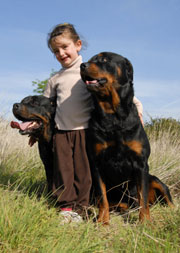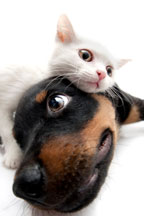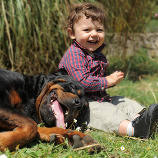
The question ‘Are Rottweilers dangerous?’ or ‘are Rottweilers aggressive?’ is (sadly) often a ‘hot topic’!
In This Article You Will Read About
In recent years, there has been a lot of attention devoted to dog bite statistics, the vilification of certain so-called ‘dangerous dog breeds’, the introduction of BSL, and a whole lot of media-induced hysteria and statistical misrepresentation.
All of this makes answering the question posed here difficult, and open to misinterpretation.
I’ve owned Rottweilers for many, many, years (both male and female, old and young), have taken care of and rehomed abandoned Pitbulls & Rotties, and owned a spirited, loving Staffordshire Bull Terrier.
One of my sons owns a stunning male Pitbull who is the darling of the local Pet Resort, and another son has an adorable Staffy pup. These are my ‘grand puppies and I love them to bits!
This may not make me an ‘expert’, but I do have a fair amount of experience with so-called ‘dangerous dog breeds’.
And what I know is that ALL dog breeds (including the Rottweiler) have the potential to be dangerous, and the key factors in determining whether a dog is going to be aggressive, emotionally unstable, fearful, overly-territorial or sometimes even downright dangerous include –
- Irresponsible breeding practices
- Abuse
- Neglect
- Lack of Socialization
- Lack of Training (or incorrect training methods)
- …. any combination of the above!
When one or more of these factors come into play, a dog of ANY BREED may become a potential danger to his family, other people (and other dogs/animals).
Dangerous Rottweilers…. The Fiction
First of all, lets get rid of that stereotypical Rottweiler… he is not the snarling, slobbering, vicious brute that is often seen on TV, or in the media.
(Of course, if you’re a thief sneaking into my house in the middle of the night, that scary image may be fairly close to the reality that will greet you as you set foot on my carpet…. Rottweilers are after all, a guardian breed!)
However, I digress. To find out what the true Rottweiler temperament, behavior and character should be, you need to look no further than the Rottweiler Breed Standard set by any of the major dog registeries in the US, UK or in this breeds’ country of origin – Germany.
Two phrases here spring to mind….
‘Good natured, placid in basic disposition and fond of children. Very devoted, obedient, biddable and eager to work…. self-assured, steady and fearless…’.
ADRK Breed Standard, Germany
‘calm, confident and courageous… with a self-assured aloofness’
AKC Breed Standard, United States
‘Not nervous, aggressive or vicious’
UK Kennel Club
So, are Rottweilers dangerous dogs? Not by design! Clearly, it isn’t an inherent or intended character trait.
Rottweilers were originally used as herding dogs, companions and guardians of livestock and possessions. They were never ‘fighting dogs’ with a killer instinct.
The indiscriminately aggressive ‘attack dog’ you are imagining? Just that, a figment of your imagination and most definitely fiction!
Are Rottweilers Dangerous? The Facts

Now does all the above mean that Rottweilers are never dangerous? Could anyone add a Rottie to their family and never worry about anyone (or anything) getting hurt?
Of course not! But in reality that is true of any breed of dog, and many other animals that we keep as domestic ‘pets’.
Breeding and Training
Choosing a Rottweiler that is the result of a sensible, well-thought out breeding program is the first step towards making sure that your Rottie is going to be a ‘safe’ dog.
Training your Rottweiler puppy properly, giving him lots of positive socialization experiences, and of course lots of love, will all ensure that your little guy grows up to fit the true Rottweiler temperament outlined in the section above.
But is that enough to enable us to say that the question ‘are Rottweilers dangerous?’ has been completely taken care of? No, not at all.
Although Rottweilers aren’t inherently dangerous dogs in terms of their attitude, there is still the potential danger posed by any big, strong animal.
Rottweiler Size
Given that a fully grown male Rottie may weigh 125lbs plus, when you put him into any situation involving a small child, elderly or frail adult, or small, fast-moving animal, the potential for DANGER comes over loud and clear.
Rottweilers are loving, goofy and playful…. and totally unaware of their size! My dogs will happily sit ‘in’ my lap (they don’t fit), and if they’re focused on chasing their ball and something (or someone) small is in the way, they may run them right over, albeit unintentionally.
Rottweilers also have a tendency to ‘lean’ against people (a throw-back to their days as cattle drovers), and the weight of an adult dog (or even an adolescent pup) could quite easily knock over a child or light/frail adult.
Rottweilers Have a Guarding and Protective Instinct
When asking ‘are Rottweilers dangerous?’, it’s also important to remember that these are working dogs and a guardian breed. They will instinctively protect their home and family if they feel they are threatened. They are also territorial and often don’t welcome strangers onto their property unannounced.

The good news is that they are very discerning in their approach to guarding, and seem to be aware that their mere physical presence (accompanied by a low growl if necessary), are enough to stop most folks in their tracks. True out-and-out aggression is extremely rare in well-bred and properly raised dogs.
For the above reasons, not every home is suited to (or safe for) a Rottweiler. Also, due to their strength and intelligence, they’re generally not recommended for first time dog owners.
Many times, Rotties raised from pups around small dogs, cats, chickens etc. do just fine, but introducing a full-grown Rottweiler into a home with a resident chihuahua (for example) should be approached with caution at first!
So again, ‘Are Rottweilers dangerous?’….. not in the way many people imagine, or simply because they are of a specific breed. But in certain circumstances or situations there is the potential for danger.
The Truth About Rottweiler Temperament, Dog Bites & Statistics
Just Google ‘dangerous dogs’ and you’ll get 71,100,000 hits. Try ‘dog bites’ and you’ll 40,900,000 options appear!
So there’s lots of information out there. The bad news is that much of it is way out of date, biased, inaccurate, misinterpreted, or based on politically weighted arguments/studies or media-type hysteria.
As I said earlier, I’m not an expert here, but I did a lot of research on the question of ‘are Rottweilers dangerous?’ and here are just a few of the interesting things I found out….
- The most recent official survey on dog bite statistics was conducted more than a decade ago
- Statistics on fatal attacks are more accurate/more current than those on dog bites in general
- Dog Bite fatalities are extremely unusual. In the US there is only one fatal attack per 151,000 victims
- Over 50% of bites occur on the dog owner’s property
- Male dogs who haven’t been neutered seem to be the most common ‘biters’
- According to figures produced by the Insurance Information Institute, dog bites cost insurance companies $356.2 million in 2007
- Children less than one year old were the age-group with the highest number of fatalities
- The second highest group were 2 year olds. In both instances between 87% and 95% of the time the children were left unattended with the dog who killed them
- German Shepherds, Rottweilers, Presa Canarios, Pit Bulls, Chows, Huskys, Doberman Pinschers, Akitas and Alaskan Malamutes are among the breeds considered to be most likely to be involved in fatal attacks
- Since 1975 over 30 different breeds have been involved in fatal attacks. These include Pomeranians, Dachshunds, Yorkshire Terriers and Labrador Retrievers. Mixed-breeds or dogs of indeterminate parentage aren’t included!
- When looking at dog bites in general, mixed breed dogs are way ahead of Pit Bulls in the equation
So, where are we now? Are Rottweilers dangerous dogs or not?
Again there’s no ‘clear cut’ answer, but there seems to be a lot of different ways to interpret the information available, and many studies contradict each other.
It’s important to separate the ‘dog bite fatality’ figures and statistics, from those relating to ‘dog bites in general’. These are two entirely different categories.
If you use some common sense, it’s fairly obvious that a bite from a Rottweiler is going to do a lot more damage than a bite from a Dachshund. If you make that several bites (or more than one dog), the Rottweiler attack is clearly more likely to result in a fatality.
So, whether it’s a Rottweiler (or a GSD, Pitbull, Chow…..), being higher up the ‘fatality statistics list’ doesn’t mean that they bite more often (and in fact this doesn’t seem to be the case), but that they do more damage.
Obtaining information for statistics relies on the reporting of dog bites, or attendance of a victim at a hospital or medical facility for treatment, and I’d guess that there’s a huge volume of un-reported bites, or those that don’t need urgent medical attention.
These are probably the result of bites by smaller dog breeds (as they do less damage) so perhaps there’s a whole ‘hidden group’, which would mean that the KNOWN statistics aren’t a true representation of the situation.
AKC Temperament Test
You’ve probably heard stories from a lot of people who say that they have experience with Rottweilers and they’re super dangerous. Or you’ve heard the horror stories on the news about dog fighting rings and dog attacks.
But there have been actual temperament tests conducted to determine how dogs react in a number of different situations with varying degrees of ‘stress’ or ‘stimuli’. Now, it’s important to note that this test is not scientific, but it does evaluate dogs of all different breeds and comes to some pretty good conclusions.
What is the ATT Test?
Let’s take a look at just what the ATT Test is. It stands for the American Temperament Test, and it’s published by the American Kennel Club and often conducted through the American Temperament Test Society, or through AKC parent clubs. Also, the test looks at how dogs react to different types of stimuli, with the intention of giving ‘breeders a means for evaluating temperament and pet owners insight into their dog’s behavior‘.
Situations include:
- Social
- Auditory
- Visual
- Tactile
- Proprioceptive (motion)
- Unexpected
By evaluating each of these criteria, it’s possible to better understand which dogs react positively even in the face of stressful situations and which ones need even more care and attention in order to recover from these types of situations.
What Does it Show?
This test specifically evaluates how well each breed of dog will ‘bounce back’ from a startling situation. The idea is to learn more about which dogs will come back from this type of situation within a reasonable amount of time and which ones need a little extra time to recover.
With this test, it’s important to look at how well the dog reacts with certain traits, such as:
- Emotional stability
- Inquisitiveness
- Cooperation
- Appropriate social behavior
- Biddability
- Quick/reasonable recovery
Dogs that don’t do well on the test may experience:
- Fear
- Shyness
- Lack of cooperation
- Inability to recover
These dogs may be more aggressive or engage in extensive barking or other undesirable behaviors.
Here’s a video of a Rottie completing the ATTS test.
What Was Found?
As we mentioned, this test is not considered a scientific study, but it is a good way to get an idea of temperament for dogs you are considering, including the Rottweiler. It’s also a good way to learn more about some of their different skills, techniques, or behaviors.
Not all dogs are tested extensively even with this temperament test, but we looked at the most common breeds that many pet owners have, and included only those breeds that have been tested at least 30 times. The Rottweiler was actually tested over 6000 times. In fact, it was the most tested breed of all.
| Breed | Tested | Pass Rate |
| BEARDED COLLIE | 51 | 56.9% |
| DACHSHUND (STANDARD SMOOTH) | 49 | 69.4% |
| CHIHUAHUA | 46 | 69.6% |
| BULLDOG | 141 | 71.6% |
| CHOW CHOW | 99 | 71.7% |
| POODLE, MINIATURE | 73 | 76.7% |
| OLD ENGLISH SHEEPDOG | 49 | 77.6% |
| SHIH TZU | 49 | 77.6% |
| POMERANIAN | 36 | 77.8% |
| POODLE, TOY | 57 | 78.9% |
| BEAGLE | 79 | 79.7% |
| COLLIE | 896 | 80.8% |
| GREAT DANE | 314 | 81.5% |
| COCKER SPANIEL | 233 | 82.0% |
| BORDER COLLIE | 312 | 82.4% |
| DALMATIAN | 359 | 83.3% |
| BOXER | 472 | 83.9% |
| ROTTWEILER | 6,012 | 84.7% |
| GERMAN SHEPHERD DOG | 3,383 | 85.3% |
| JACK RUSSELL TERRIER | 69 | 85.5% |
| CAVALIER KING CHARLES SPANIEL | 62 | 85.5% |
| GOLDEN RETRIEVER | 813 | 85.6% |
| MIXED BREED | 1,218 | 86.3% |
| BASSET HOUND | 37 | 86.5% |
| AMERICAN PIT BULL TERRIER | 931 | 87.4% |
| CANE CORSO | 235 | 88.1% |
| IRISH WOLFHOUND | 101 | 90.1% |
| STAFFORDSHIRE BULL TERRIER | 143 | 90.9% |
| LABRADOR RETRIEVER | 842 | 92.2% |
| ENGLISH COCKER SPANIEL | 75 | 93.3% |
| FRENCH BULLDOG | 52 | 96.2% |
In total there are 250 breeds listed on the ATTS site and you can see a detailed breakdown of all of the results here. When taking all breeds into account, the Rottweiler comes in at 128 out of 250, so again right in the middle.
Dogs that are quite common, such as the Golden Retriever had a pass rate of 85.6%. Dalmatians saw a pass rate of 83.3%, while Collie’s saw a pass rate of 80.8%. The Bearded Collie had a pass rate of only 56.9%.
On the other hand, so-called, dangerous breeds saw decent scores that you may not expect. The American Pit Bull Terrier had a pass rate of 87.4% German Shepard’s had a pass rate of 85.3%. Mixed breeds or ‘mutts’ had a pass rate of 86.3%. And the Rottweiler had a pass rate of 84.7%.
Those numbers tell us that these ‘dangerous breeds’ or breeds with poor temperaments are not actually like that, in fact, they score highly in terms of temperament. Those that are aggressive are the product of their upbringing. Compared to the top 30 most common dog breeds that we looked at, the Rottweiler actually came in right in the middle at number 14. That means there were only 13 breeds of dogs that scored higher. You can see the entire list of
And dogs like the Bearded Collie, Dachshund and Chihuahua came in with scores under 70% and ranked at the very bottom of the list.
What this tells us is that if you’re wondering, ‘are Rottweilers mean?’ the answer is no, not by nature.
The Bottom Line…..
So, what can we take away from here?
To me it has to be that ‘Rottweilers have the potential to be dangerous in certain situations’. Not a very snappy answer, but accurate.
Both genetic and environmental factors have to be taken into account, including the dogs’ parentage, care, training, socialization, home environment, supervision and a whole lot more…. so you can’t judge the entire breed based on the actions of one (or even several) individual dogs.
This is true for ALL breeds, in every area of behavior. MY answer to the question ‘Are Rottweilers Dangerous’ is this….
‘In my opinion, and based on decades of personal experience, I firmly believe that Rottweilers are NOT inherently dangerous dogs.
Each dog is an individual and should be judged on his/her own merits.
With the right breeding and upbringing Rottweilers make wonderful companions and pets, and are loving, loyal, intelligent, intuitive – and goofy dogs!
I would trust my Rotties with my life, and the lives of the people closest to my heart – my children and grandchildren.’
Here are some beautiful Rotties showing off their true nature…. got to love them 🙂
|
|




